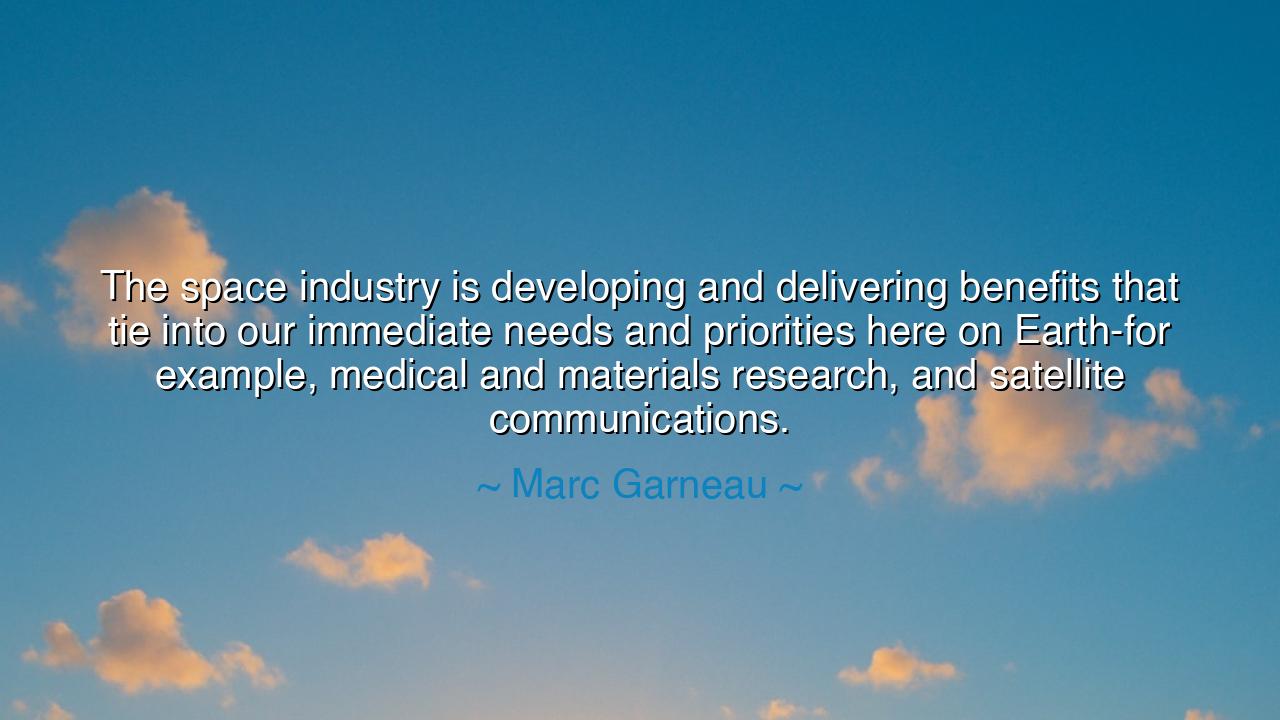
The space industry is developing and delivering benefits that tie
The space industry is developing and delivering benefits that tie into our immediate needs and priorities here on Earth-for example, medical and materials research, and satellite communications.






In the words of Marc Garneau, astronaut, scientist, and statesman, there glows a truth that bridges the heavens and the Earth: “The space industry is developing and delivering benefits that tie into our immediate needs and priorities here on Earth—for example, medical and materials research, and satellite communications.” These are not the idle reflections of a dreamer staring into the stars, but the wise acknowledgment of one who has journeyed beyond our world and seen how the cosmos and the human condition are bound together. His words remind us that exploration is not escape — that the quest for the stars has always been, and must always remain, an act of service to Earth.
The origin of this quote lies in Garneau’s unique life and calling. As the first Canadian to travel into space, he stood at the frontier of human discovery, gazing down upon our blue planet, fragile and radiant amid the void. From that vantage, he saw what few have ever seen — that the Earth and its people are one, and that the vast endeavor of space exploration is not an indulgence of curiosity, but an investment in humanity’s survival and progress. When he speaks of medical research, materials science, and satellite communication, he speaks as both explorer and guardian — one who has touched the stars only to better serve the soil beneath his feet.
In his words, there is a powerful reversal of perception. Many, in their ignorance, ask why we reach for the stars when so many problems remain unsolved below. Yet Garneau teaches that it is precisely through this reaching — through the courage to explore — that we find solutions for our suffering. The tools that monitor our changing climate, that guide rescue ships through storms, that allow doctors to consult across continents — all are gifts of the space age. The space industry, in its search for distant worlds, has transformed our own. From satellites that connect hearts and economies to innovations in medical imaging and telemedicine, the quest for the infinite has brought healing to the finite.
Consider, for instance, the story of the MRI machine, whose roots trace back to the technologies developed for space research. The study of how materials and magnetic fields behave beyond gravity’s reach gave birth to one of the most powerful diagnostic tools in human history — one that now saves countless lives each day. Or the countless satellite systems that map weather, monitor agriculture, and bring knowledge to villages once isolated by distance. What began as the dream of a few became the shield and sustenance of many. This is the essence of Garneau’s wisdom: that exploration, rightly guided, is not indulgence but inheritance, not luxury but legacy.
Yet there is also humility in his words. By tying the achievements of the space industry to “our immediate needs and priorities,” Garneau reminds us that science must serve the soul, that ambition must remain anchored in compassion. The stars may dazzle us, but it is the Earth that nourishes us; the heavens may call, but our duty remains below. The ancients once built temples to the sky — pyramids, ziggurats, observatories — not to flee the world, but to understand it better. In this same spirit, Garneau urges us to ensure that every advancement, every rocket launched, every experiment performed beyond the atmosphere, finds its ultimate purpose in improving life on this planet.
His words echo the ancient wisdom of balance — that progress without purpose is hollow, and discovery without compassion is perilous. In the time of Galileo, men looked to the heavens and saw their place in the cosmos redefined; in the time of Garneau, we must look to the heavens and see our responsibility renewed. The true mission of space exploration, he teaches, is not conquest, but connection — the weaving together of science, stewardship, and solidarity among all who dwell beneath the same sky.
So, my children, take this teaching as both vision and vow: reach high, but remember why. Let your ambitions soar like rockets, but let your hearts remain rooted in service. If you seek the stars, do so not to escape the Earth, but to uplift it. Study, innovate, and explore — but always ask: how does this serve life? Support the science that heals, the technology that unites, the exploration that enlightens. For the future will not be won by those who stand still in fear, nor by those who race ahead in pride, but by those who remember that knowledge and compassion are two wings of the same bird.
And as Marc Garneau teaches, the heavens were never meant to divide us from Earth, but to remind us of its worth. The stars are not our escape; they are our mirror — showing us what humanity can become when guided by wisdom, humility, and care. Let every discovery we make among them be a promise: that as we rise, we will lift the world with us.






AAdministratorAdministrator
Welcome, honored guests. Please leave a comment, we will respond soon